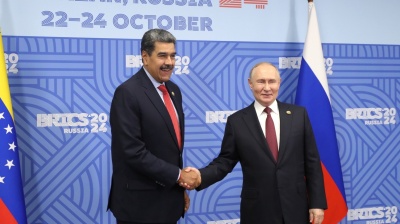German doctors confirmed that anti-corruption blogger and opposition activist Alexei Navalny was poisoned with an agent from the Novichok family of nerve agents.
Novichok is the Russian-made military grade nerve agent that was used on the ex-spy Sergei Skripal and his daughter Yulia in the UK in March 2018.
Navalny has been a thorn in the side of the Kremlin and Russia’s elite with his constant stream of exposes into corruption and their hidden wealth.
He fell ill on August 20 during a flight from Tomsk to Moscow in what his aides said was a poisoning attack. His plane was forced to make an emergency landing in Omsk, where he was taken to hospital in a coma. After two days he was evacuated to Berlin by a privately funded ambulance plane and put under heavy police guard at Berlin’s Charité hospital.
The two-day delay in Omsk by obstructive doctors seemed designed to give the toxin in his system a chance to dissipate, but German doctors have now confirmed beyond reasonable doubt that Navalny was poisoned by a nerve agent from the Novichok family.
Chancellor Angela Merkel’s spokesman, Steffen Seibert, said in a statement on September 2 that testing by a special German military laboratory had shown proof of "a chemical nerve agent from the Novichok group."
Novichok was developed in the Soviet-era and is a cholinesterase inhibitor that affects the signals in the brain.
Seibert said the German government will inform its partners in the European Union and NATO about the test results. The German doctors have also said they will co-operate with any Russian investigation into what happened to Navalny.
Merkel has already called on Russia to conduct a full investigation and bring the perpetrators to justice. However, Russian Foreign Minister Sergei Lavrov said on September 1 that no criminal investigation could be launched “until we have found out what is wrong with [Navalny].”
Navalny’s allies in Russia have insisted he was deliberately poisoned by the country’s authorities, accusations that the Kremlin rejected as "empty noise."
The Russian doctors who treated Navalny in Siberia have repeatedly contested the German hospital’s conclusion, saying their tests for poisonous substances came back negative.
News

APEC meeting closes in South Korea, WTO dead and buried
This was not a summit. It was a eulogy for the WTO, and APEC just lowered the flag to half-mast.

Turkish state grabs another fintech as company seizures continue at pace
Turkey first seizes companies, then tries the suspects. Some companies are sold before the trial process.

Ukraine’s elite HUR forces turn the tide in the battle for Pokrovsk, as Russia’s effort to capture key logistics hub fails
The battle for Pokrovsk became intense early on November 1and it looked like the fall of the key logistics hub to Russia was imminent. But a bold counterattack by Ukraine’s elite HUR forces seems to have turned the tide.

US prepares attack on Venezuela as Maduro begs Putin for aid
The Trump administration has reportedly drawn up a list of potential military targets within Venezuela as part of its intensifying pressure on President Nicolás Maduro, who has turned to Moscow seeking urgent military assistance.

